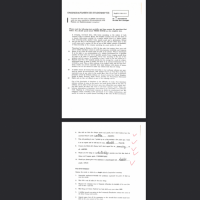Please read the following text carefully and then answer the questions that
follow. You should spend about THREE HOURS on the complete test.
5
10
15
20
25
30
A sweeping, tree-lined drive, with lawns stretching to the waters of Loch
Lomond, leads to Cameron House. The Scottish mansion was once the home of
a famous 18th-century novelist. In a nearby annexe there is a leisure centre
with swimming pools, snooker room, squash courts and a gymnasium. Behind
this lies the first of 100 timeshare lodges. On the 108-acre estate there is also
a golf course and a marina. All this is part of the holiday concept of timeshare,
or time-ownership as the company operating the estate prefers to call it.
Timeshare began in Britain in 1976. By the early 21st century there were well
over 2 million timeshare owners in 2,500 developments worldwide, and Cameron
House is one of the 80 resorts that are part of the scheme. What is timeshare?
It is the right to use accommodation at a holiday development for a specified
number of weeks each year over a specified period of time, ranging usually from
25 years to 80 years or “perpetuity”. Prices vary according to the size of the
property and the season. It is possible to buy a week in the low season at a
Spanish resort for a few hundred pounds, but the average for a week in a three-
bedroomed home is about £ 10,000, and there is an annual maintenance fee of
£ 80-200 a week. There is little criticism of the product itself, and the best time-
share resorts can provide enjoyable hotel style holidays with plenty of leisure
facilities, but no one should be under any illusion that they are cheap.
A further reason for buying time-ownership is that exchange schemes are oper-
ated for almost all developments. This enables owners to swap their weeks for
equivalent ones at any resort in the world. More than 75 per cent of timeshare
properties owned by British residents are located outside the United Kingdom,
largely in Spain, Portugal, Malta, Greece, Austria and Switzerland. Discounted
flights and car hire are offered as part of the exchange service.
One of the drawbacks of timeshare is the difficulty of resale. New timeshare
schemes continue to come on the market and most people prefer to buy new. In
addition, all the effort of the developers goes into selling their new resorts, leav-
ing little chance for those who want to sell their existing “week”. There are,
however, alternatives to timeshare, where there is no “ownership” of a particular
week. Hapimag is a Swiss-based company in which the shareholders own the
company’s assets, including 2,300 apartments in 41 holiday destinations, and
qualify for weeks on a points system according to the value of their investment.© Fernstudienzentrum Hamburg
2
Vocabulary Notes
Part A: Comprehension
Please answer in complete sentences.
1. Write your own definition of the concept of timeshare.
2. What is the connection between a famous 18th-century novelist and the con-
cept of timeshare?
3. What can affect the individual cost of timeshare?
4. Why does the cost of a timeshare property not end with its purchase?
5. What are the advantages and disadvantages of this kind of holiday?
6. How does the Hapimag scheme differ from other timeshare concepts?
Part B: Translation
Please translate into German the last two sentences of the text.
Part C: Vocabulary
At the end of each of the following sentences you will see a noun or verb which
needs to be changed into an adjective by adding a prefix or suffix or both. Just
write down these adjectives.
1. These shoes don’t look so special, but my goodness they’re very
__________________ . (COMFORT)
2. That’s a good shop to go to, and the assistants are always so polite and
__________________ . (HELP)
3. When I’ve been waiting a long time to be served, I begin to feel
__________________ . (PATIENT)
4. I dislike these big department stores; they’re so __________________ . (PER-
SON)
5. Oh dear! I thought that plastic bottle was supposed to be __________________ .
(BREAK)
perpetuity (l. 13) in alle Ewigkeit
to swap (l. 21) tauschen
assets (l. 32) Vermögenswerte© Fernstudienzentrum Hamburg
3
6. She told me that she always wears real pearls, but I don’t believe her. I’m
convinced they’re quite __________________ . (WORTH)
7. This old painting is one I picked up at a flea market a few years ago. I took
it to an expert and he told me it’s very __________________. (VALUE)
8. I know you think she’s funny, but I don’t regard her as __________________ at
all. (AMUSE)
9. Thank you for being so __________________. I promise you that this kind of
thing won’t happen again. (UNDERSTAND)
10. Would you please give every assistance to handicapped and __________________
people. (ABLE)
Part D I: Grammar
Replace the words in italics by a single adverb of equivalent meaning.
1. Somewhat uncharacteristically the politician expressed his point of view in
very few words.
2. This lift is out of order for the time being.
3. Because the company was in financial difficulties he decided of his own free
will to take a pay-cut.
4. The Song and Dance Festival has been held every year since 1969.
5. A million pounds was given to the Leukaemia Foundation without the name of
the donor being made public.
6. Experts agree that all the passengers on the aircraft that crashed must have
died at the very moment of the crash.
Part D II: Grammar
Read the following story carefully and fill the gaps with a suitable word. Just write
the number of the gap and the missing word.
Little people, big business
(1) _______________ to recent statistics, we are spending more and more on chil-
dren’s wear. This growth has (2) _______________ helped by an explosion of interest
in fashion (3) _______________ children, especially when it is worn by the children© Fernstudienzentrum Hamburg
4
of celebrities. When it comes to clothes for youngsters, jeans and a T-shirt are no
longer (4) _________________, it seems. The market has moved away
(5) _______________ basics towards stylish outfits.
The (6) _______________ majority of 8- to 12-year-olds have their clothes bought for
them. There is considerable concern – (7) _______________ among parents – about
children even younger (8) _______________ eight feeling under pressure to have the
right designer labels in (9) _______________ to fit in with their school
(10) _______________. This leads to “pester power“, when kids do everything
(11) _______________ to make sure that their parents buy them what they want.
To some extent (12) _______________ are to blame for encouraging the boom in
labels – Armani Junior, Baby Dior, Gucci, Calvin Klein and Versace. They have
been looking for child versions (13) _______________ their own favourite brands and
manufacturers are now exploiting (14) _______________ . Some parents have a
genuine interest in design, (15) _______________ just want to show you how much
they spend (16) _______________ their children. A few can’t (17) _______________
the adult designer outfit and so live through their children.
Mail order and online children’s wear is big business (18) _______________ accounts
for almost 20 per cent of the total market. Ordering from home is ideal for parents
(19) _______________ are both working and don’t always have (20) _______________
to visit all the shops. Many stores in town and city (21) _______________ are
already offering a full range of clothing for young people. (22) _______________ 1986
Millard Drexler (President of the American company Gap) created Gap Kids,
because he couldn’t find basic, good-looking (23) _______________ for his own son.
Baby Gap followed in 1990. This revolution in the children’s (24) _______________
has certainly made shopping more fun than (25) _______________ before.© Fernstudienzentrum Hamburg
5
Part E: Comment
Please answer ONE of the following questions. Write about 250 words.
1. Describe some of your personal vices (= Laster) and/or virtues (= Tugenden).
Which aspects of your lifestyle are you happiest with and which would you
most want to change?
2. Write about your favourite leisure activity.
Mention the following: the reason(s) you like it, the positive / negative aspects
of this activity and any interesting experiences you have had whilst doing this
activity.
3. People like Ian Mucklejohn (Unit 4) are examples of older people who have
fulfilled their desire to have children. What do you think are the disadvan-
tages and possible advantages for the children concerned of having parents in
their fifties, or even older?
 2.22
2.22
 2.22
2.22
 Bewertungen
Bewertungen
 Benötigst Du Hilfe?
Benötigst Du Hilfe?
 Was ist StudyAid.de?
Was ist StudyAid.de?
 Rechtliches
Rechtliches
 Mehr von chrisis
Mehr von chrisis


;)






